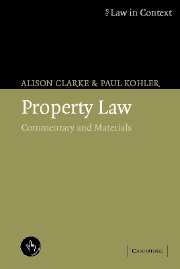Book contents
- Frontmatter
- Contents
- Preface
- Acknowledgments
- Table of cases
- Table of statutes
- Table of statutory instruments
- Table of treaties
- Table of EC legislation
- Part 1 The concept of property
- Part 2 The nature of proprietary interests
- Part 3 The acquisition and disposition of property interests
- 10 Title
- 11 Acquiring title by possession
- 12 Transfer and grant
- 13 Acquiring interests by other methods
- 14 Enforceability and priority of interests
- 15 Registration
- Part 4 Proprietary relationships
- Bibliography
- Index
11 - Acquiring title by possession
Published online by Cambridge University Press: 05 June 2012
- Frontmatter
- Contents
- Preface
- Acknowledgments
- Table of cases
- Table of statutes
- Table of statutory instruments
- Table of treaties
- Table of EC legislation
- Part 1 The concept of property
- Part 2 The nature of proprietary interests
- Part 3 The acquisition and disposition of property interests
- 10 Title
- 11 Acquiring title by possession
- 12 Transfer and grant
- 13 Acquiring interests by other methods
- 14 Enforceability and priority of interests
- 15 Registration
- Part 4 Proprietary relationships
- Bibliography
- Index
Summary
Introduction
When a person takes or retains possession of land or goods without the consent of the person entitled to them, three consequences follow. The first is that the person taking possession thereby acquires a title to an interest in the land or goods that is immediately effective against the whole world except those with a better right to possession. The second (modified but not removed altogether for registered land by the Land Registration Act 2002) is that the person who is dispossessed thereby acquires a right to recover possession (or, in the case of goods, a right to sue for damages and/or the return of the goods) which will be lost if not exercised within a limitation period. The third is that a title lost because not exercised within the limitation period is extinguished. It is not transferred to the usurper – the title the usurper acquired by taking possession in the first place simply becomes no longer subject to challenge from the person whose title is extinguished.
There are two distinct principles requiring justification here. We considered the justifications for the first principle – that possession, even if wrongfully taken, confers an entitlement protectable by law – in Chapter 7. In this chapter, we concentrate on the second principle – that those entitled to possession will be deprived of all entitlement without compensation merely as a result of neglecting to take action against usurpers in time.
- Type
- Chapter
- Information
- Property LawCommentary and Materials, pp. 406 - 447Publisher: Cambridge University PressPrint publication year: 2005

